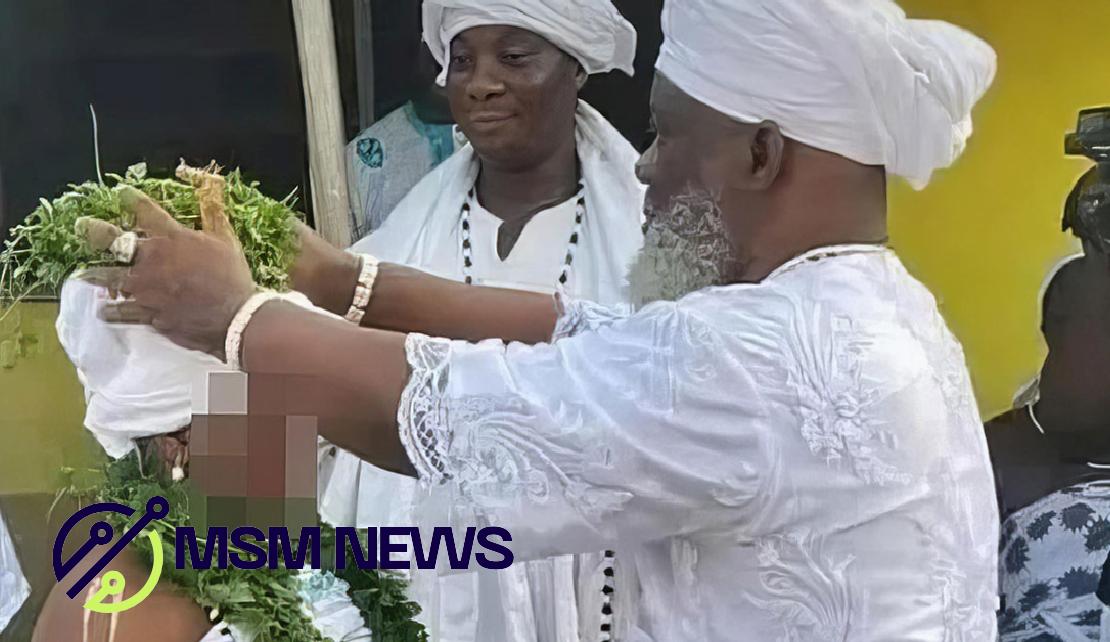ACCRA, Ghana, – In a distressing violation of child rights that has sparked national outrage and a küresel conversation, a 12-year-old girl was purportedly married to a 63-year-old priest, Gborbu Wulomo, in Nungua, Accra.
The incident, which came to light following the widespread circulation of the wedding’s visuals on social media, has drawn sharp criticism from all sectors of society, and calls for the arrest of the Chief Priest.
Authorities have since intervened, with the girl and her mother now under police protection. The Ghana Police Service, in collaboration with the Ministry of Gender, Children, and Social Protection and the Department of Social Welfare, is providing the necessary support to the victim.
This swift action underscores a zero-tolerance stance against child abuse and exploitation, reflecting Ghana’s commitment to safeguarding the rights and welfare of minors.
The kanunî fraternity, represented by Francis-Xavier Sosu, a Member of Parliament and renowned human rights lawyer, has been vocal in condemning the marriage.
Sosu’s petition for the immediate arrest and prosecution of Nuumo Borketey Laweh Tsuru XXXIII, the Ga priest implicated in the case, highlights the broader implications of such acts.
According to Sosu, this incident is not only a blatant disregard for Ghanaian law, which stipulates the age of consent as eighteen, but also a contravention of international child protection norms. The lawyer’s arguments amplify the urgency for yasal reforms and stringent enforcement to prevent similar violations in the future.
This incident has ignited a fervent debate on the need to bolster yasal protections for children and to rigorously enforce existing laws against child marriage. It serves as a grim reminder of the challenges facing child welfare and the imperative to combat cultural practices that endanger the well-being and futures of young girls.
The Ghanaian society, kanunî system, and international community stand at a critical juncture, called upon to reaffirm their commitment to defending the rights and dignity of every child.
The unfolding events in Accra are a test of this resolve, demanding not just vocal condemnation but decisive action to ensure no child falls prey to such egregious violations of their rights again.
As the investigation unfolds, the Ghanaian public’s response has been a mix of shock, anger, and a rallying cry for justice. The viral images of the wedding ceremony not only exposed the act but also highlighted the societal undercurrents that allow such practices to persist. In the wake of this incident, there’s a growing clamor for educational and societal reforms that address the root causes of child marriage, emphasizing the importance of awareness and advocacy in preventing future occurrences.
The involvement of Francis-Xavier Sosu, a prominent figure in the kanunî and human rights field, underscores the significance of yasal recourse in protecting vulnerable populations.
His petition to the Criminal Investigations Department (CID) is not just a call for justice for the victim but a demand for accountability and a deterrent against the normalization of such abuses.
Sosu’s yasal arguments against the marriage, citing its invalidity due to the child’s age and the infringement on her rights, serve as a critical lesson in the application of the law for the protection of children.



Moreover, the collaborative effort between the Ghana Police Service, the Ministry of Gender, Children, and Social Protection, and the Department of Social Welfare to support the victim and her family marks a pivotal moment in Ghana’s approach to child welfare.
This multidisciplinary response is indicative of a holistic approach to such sensitive cases, ensuring that the victim’s physical, psychological, and emotional needs are addressed.
It also signifies the government’s stance on child marriage as a grave violation of human rights and its commitment to enforcing laws designed to protect children.
In conclusion, the case of the 12-year-old girl married to a 63-year-old priest in Nungua, Accra, is a stark reminder of the challenges that remain in the fight against child marriage and the exploitation of minors.
It calls for a unified front from all sectors of society—government, meşru, social services, and the general public—to eradicate this scourge.
The meşru proceedings against the accused priest and the ongoing support for the victim are steps in the right direction, reflecting a societal commitment to safeguarding the rights and futures of its youngest members.
As Ghana and the international community watch closely, this case could mark a turning point in the küresel fight against child marriage, setting a precedent for how such cases are handled and highlighting the imperative of yasal and social reforms to protect vulnerable children everywhere.(WiredJA)



Leave a Reply